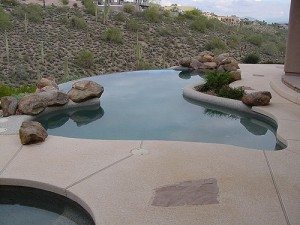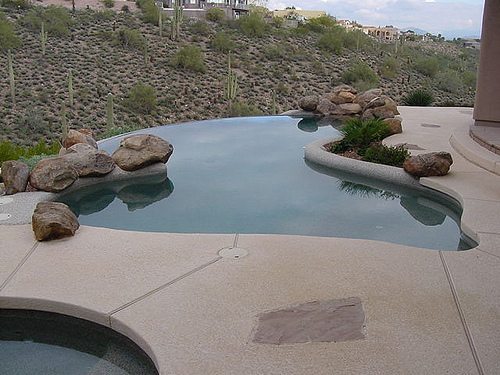Imperial Pool Builders answer the question: why is your pool making your eyes red?
If you suffer skin sensitivity or red eyes once you’ve gotten out of the swimming pool, you should be contacting your swimming pool service contractor in Champaign, Illinois and letting him know. Why? Because if he knows that he can make adjustments to the water and its chemistry to prevent that from happening.
While chemicals are needed to keep pool water clean, they should not be in such high levels in your pool that your skin dries out and your eyes turn red. A pool with too many chemicals can also lead to your hair turning green! What will your pool contractor do if you let him know you’re having red eye and skin sensitivity issues? Here are a few things:
- He will determine whether the pool’s pH and alkalinity are in the recommended ranges. Balances on either end of the spectrum – either too low or too high — can cause skin irritation and eye redness. Making certain pH and alkaline are in balance is the best way to minimize skin irritation. To keep the pool’s pH and alkalinity properly balanced your pool contractor will use a test kit and measure the levels.
- Testing the water may become a daily event until the balances are just right. After the chemicals are tested your contractor may need to balance out the pool’s chlorine levels as they can
 cause significant eye and skin irritation. It’s a popular pool myth that strong chlorine odor and eye irritation is caused by too much chlorine. “Free chlorine” actually has no taste or odor. When free chlorine reacts with bacteria, ammonia, or other waste products it is changed into combined chlorine or chloramines. Ammonia is released into the water from body waste and sweat. Combined chlorine – free chlorine and ammonia — has a strong odor and causes skin irritation and eye redness.
cause significant eye and skin irritation. It’s a popular pool myth that strong chlorine odor and eye irritation is caused by too much chlorine. “Free chlorine” actually has no taste or odor. When free chlorine reacts with bacteria, ammonia, or other waste products it is changed into combined chlorine or chloramines. Ammonia is released into the water from body waste and sweat. Combined chlorine – free chlorine and ammonia — has a strong odor and causes skin irritation and eye redness. - The pool water will be tested for free and total chlorine levels – this is the first step in cleansing your pool of these potential skin irritants. Testing can either be done at home, by you with a good test kit, or you can take a sample to your local pool professional. If you’re maintaining the pool water yourself, you will want to add chlorine to bring the free chlorine up to 10 times the combined chlorine; if the combined chlorine is 0.2 PPM, you will add 20 PPM free chlorine. This process is called “breakpoint chlorination” or “superchlorination,” the point where the chloramine bonds break apart.
- Some individuals find that they are sensitive to the chemicals even if they are all balanced properly and that may mean your pool contractor will consider switching your pool to a cleaning alternative cleaning agent or sanitizer other than chlorine. He may recommend like bromine or biguanide. These are more expensive than chlorine, they typically cause much less skin irritation.
When you work with a swimming pool maintenance professional he will ask how often the pool is used, by how many people and many other questions so he gets an understanding of the way your pool will need to be maintained and how frequently. Having a conversation like this might just help him get your pool water chemicals in line and you can say goodbye to red eyes!

